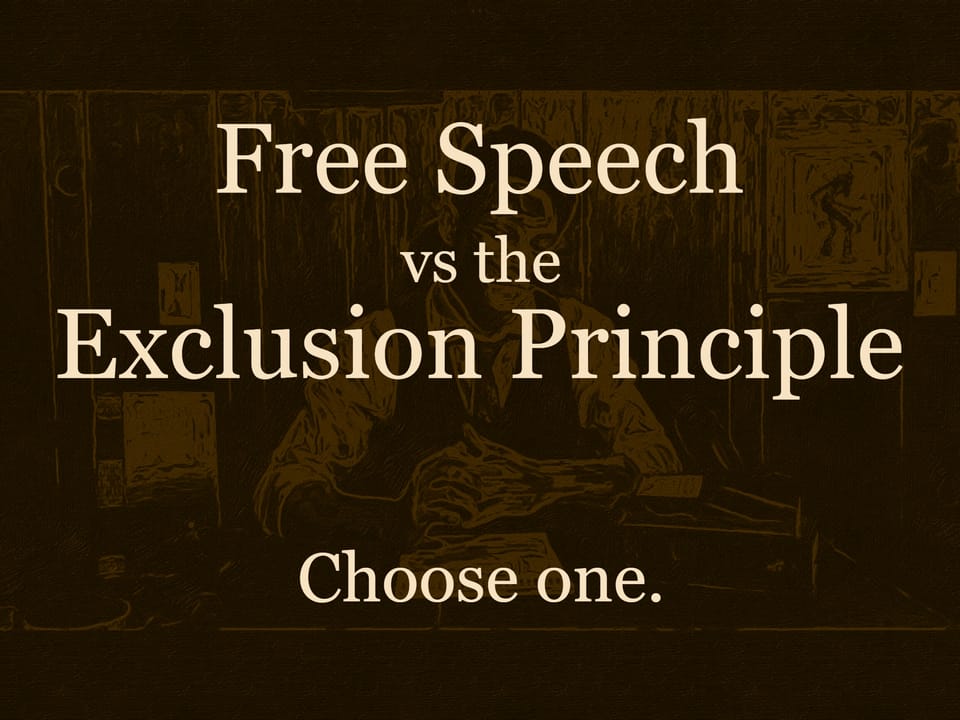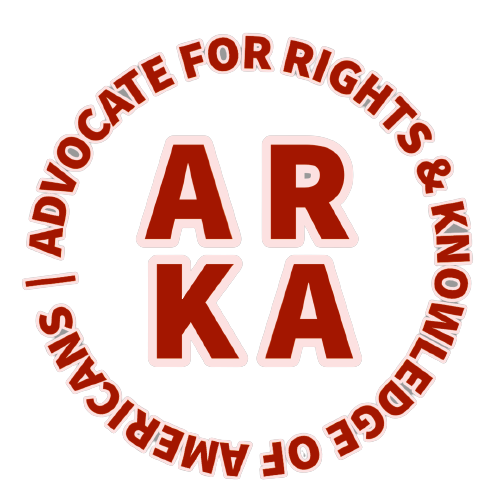Free Speech vs The Exclusion Principle

Choose one.
The concept of free speech sounds lofty and romantic on the surface, but it is an anti-right (i.e. a privilege). That is, it results in less property rights of citizens and more power to the state.
This is because the consequences of free speech are at odds with the exclusion principle, which is a simple principle used to determine if one owns something. The exclusion principle states that if a man owns property, then he can exclude whomsoever he chooses to exclude, whenever he chooses. If he is not able to exclude someone from his property, then he does not [solely) own it. Indeed, anyone who cannot be excluded from some property must have at least de facto ownership of that property. Whether he is sitting in the bathroom of his own house or at a cinema that he owns, if it is his property, he can choose to use it however he so wishes, so long as he honors the property rights of others (such as mutually agreed-upon obligations with his customers). Any 2nd party that has the power to occupy or use his property against his wishes is a 'de facto' owner of that property. Hence, to own property is to be able to exclude others at one's own whims.
The appeal to "free speech" has indeed been used to defend true property rights, but like most bad ideas, it can (and has, on a significant scale) be used for the reverse. This is what it means for an idea to be arbitrary. When the Christian baker cries out "free speech" in response to legislatures attempting to regulate what ideas he can advocate within his own property, he is using the free speech appeal to protect his property rights (though, there are better arguments he could use). But when the same baker goes into the gay baker's place of business, decries him to be a vagabond, and refuses to be excluded from that person's property by appealing to "free speech", he is using the appeal to encroach upon another's property. This latter scenario has been played out in privately owned businesses (both physical and digital) from both sides of the political arena. Whenever these appeals are granted by legislatures, property of citizens becomes more regulated; and since whomsoever controls property has a de facto ownership of it, the true ('de jure') owners end up with less rights. Government is that de facto owner. [this de facto ownership of property leads us into a bizarre, arbitrary scenario known as 'public goods', but that is a topic for another time]
As for censorship, indoctrination, and language degradation, free speech has played a pivotal role in ensuring that these evils exist and exist on grand scales. When internet censorship became apparent to the public in 2010s, many claimed that the owners of these platforms had a right to manage their property as they see fit, so long as those platforms upheld any obligations that they agreed to with their customers. This argument relies on a critical assumption that the platforms were the legitimate property of the platforms themselves; and that is not entirely true.
In the beginning, the tech platforms had little incentive to censor in the way that they do now. It is not merely coincidence that they censor anti-State ideas, or pro-liberty ideas. It is not merely coincidence that they indoctrinate users (often at-risk users and youths by targeting those user's "ad feeds" via the Redirect Method and similar software) into being statists. From the beginning, it was the government chastisement sector - the security state apparatus and police forces - that wished to censor and indoctrinate on scales that would greatly overshadow the "Public Interest" standard of the radio era. The security state apparatus gave incentive to the platforms first, and only then did the platforms partake in the control of information. It was at that point that the ownership of the platforms became blurry. This is because excess taxation ("grants") were gifted to the platforms and non-profits that specialized in information control schemes; and legal privileges were gifted as well. These moneys and legal privileges were taken from citizens. After all, government does not create - only the economic trader creates. Government takes. As such, with or without our consent, our property was ultimately confiscated so that these businesses could control what we say, what we see, and who we can engage with. To the extent to which our property and freedoms were gifted to the platforms is the extent to which those platforms belong to us.
All the while, this obscure partnership between government, big tech, and the CVE non-profits relied on the "free speech" appeal to disguise the government information control schemes at play. No matter what form the censorship and indoctrination took, the players could cry out that they have the right to "free speech", and the public, ever ignorant in the government grant programs, either ignorantly agreed that the platforms had that right; or tyrannically believed that government ought to be wielded against the tech platforms. The former belief is ground in ignorance of where the ownership lies. The latter belief is hypocritically ground in the idea that a problem caused by government ought to be solved by more government!
In fact, it was only a very small subset of people that either knew or at least suspected that government was both the catalyst and manager of "big tech censorship". These people claimed that the solution was not to wield more government (anti-trust enforcement). Nor was the solution to allow the problem to persist "free speech". No, the solution was always to eliminate the government agencies, taxations, and legal privileges involved.
In summary, if liberty is only meaningfully defined by the ability to contract and hold property, and those are only meaningfully defined by the Exclusion Principle, yet the doctrine of Free Speech can negate that principle, then Free Speech results in less liberty in the worst case while not aiding in liberty at all in the best case.

Member discussion